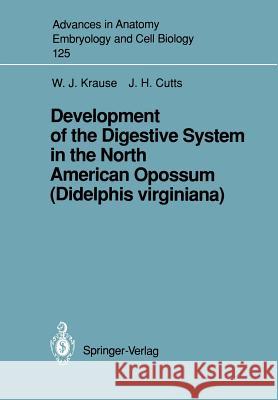Development of the Digestive System in the North American Opossum (Didelphis Virginiana) » książka
Development of the Digestive System in the North American Opossum (Didelphis Virginiana)
ISBN-13: 9783540551492 / Angielski / Miękka / 1992 / 151 str.
Development of the Digestive System in the North American Opossum (Didelphis Virginiana)
ISBN-13: 9783540551492 / Angielski / Miękka / 1992 / 151 str.
(netto: 384,26 VAT: 5%)
Najniższa cena z 30 dni: 385,52
ok. 22 dni roboczych
Bez gwarancji dostawy przed świętami
Darmowa dostawa!
The North American opossum (Didelphis virginiana) generally is regarded as an important animal, phylogenetically. It is considered to represent a prototype marsupial and closely resembles fossil didelphids (Tyndale-Biscoe 1973). Numerous studies concerning the reproductive biology, embryology, and neurobiology of the opossum have been published. More recently, Didelphis has become popular as an animal model for gastroenterological studies because of the remarkable anatomical and physiological similarities of the esophagus as compared to that of man. Most of the studies of early development have concentrated on early cleavage stages and the formation of the three primary germ layers (Hartman 1916, 1919) and fetal membranes (Selenka 1887; McCrady 1938). The ova of Didelphis remain in the oviduct only for about 24 h before entering the uterus. A corona radiata is absent and each oocyte is surrounded only by a perivitel line space and a zona pellucida (Talbot and DiCarlantonio 1984). During the short transit period, the egg is fertilized by a single spermatozoon (Rodger and Bedford 1982a, b)."











